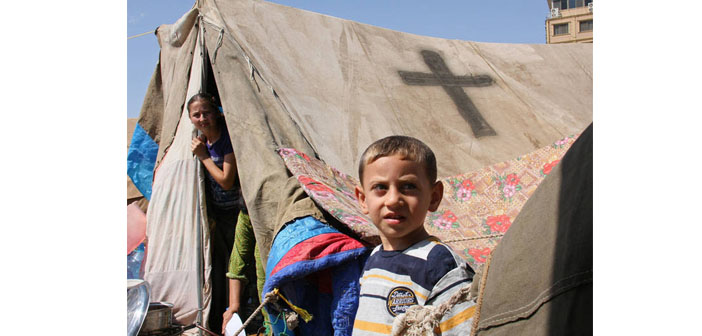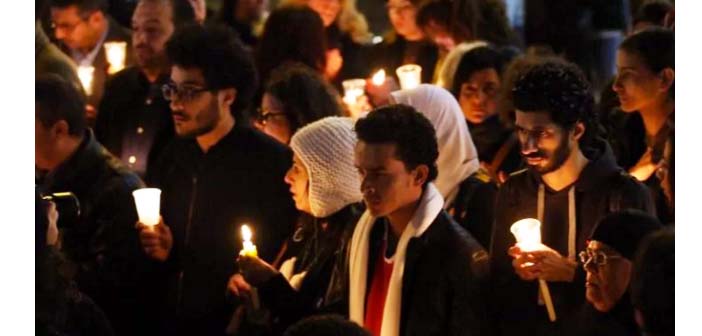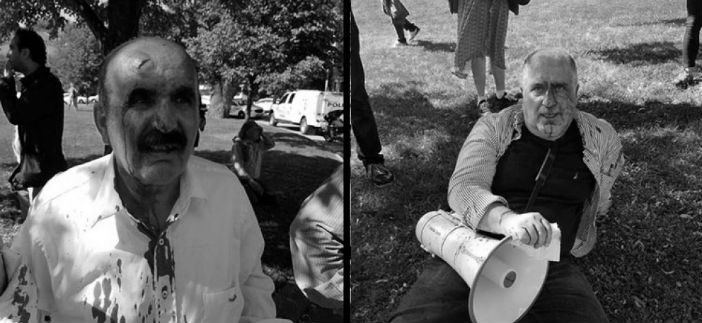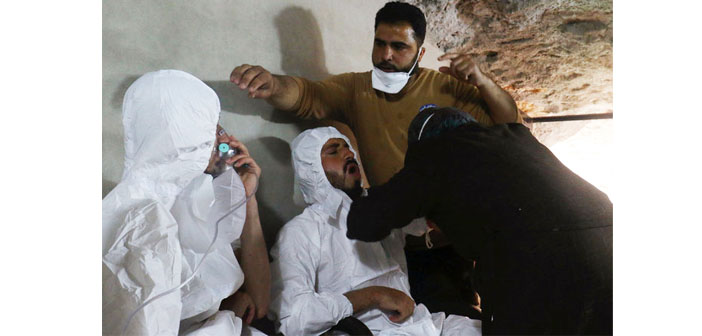Chair of American Mesopotamia Organisation David William Lazar actively worked in Donald Trump's presidential campaign and was on the advisory committee for the American MidEast Coalition for Trump. Lazar answered our questions concerning the situation of Christian minorities in Iraq and Syria and US policies for Middle East and migration that changed with Trump administration.
Minority
groups in Iraq have been demanding an autonomous region in Nineveh.
United under the name of “Al-Rafidian Coalition”, Turkmens,
Yazidis and Assyrians declared their demand of autonomous region
consisting of 3 cantons in Sinjar, Nineveh and Telafar which will be
subjected to Baghdad government. The declaration was signed by Chair
of Yazidi Independent Supreme Council Naif Dawoud, Chair of
the Turkmen Rescue Foundation Ali Akram Al-Bayati and Chair
of American Mesopotamia Organisation David William Lazar. Lazar
actively worked in Donald Trump's presidential campaign and was on
the advisory committee for the American MidEast Coalition for Trump.
As prominent figure in American Assyrian society, Lazar answered our
questions concerning the situation of Christian minorities in Iraq
and Syria and US policies for Middle East and migration that changed
with Trump administration.
Al-Rafidain Coalition has recently released a declaration, which you also supported as the Chair of American Mesopotamia Organisation. This declaration fully expressed the demand of autonomy by all minorities in Iraq, especially the Christian minorities. Could you please provide an overview concerning the condition of Christian minorities in Iraq and Syria? Why is the demand of autonomy necessary?
The ethno-religious minorities of Iraq have suffered at the hands of all the brutal regimes that have ruled the Iraqi state since its inception, however with the US invasion of Iraq in 2003 the suffering of these groups reached higher levels They were targeted by both Shiite and Sunni criminal gangs masquerading as religious militias, this intolerable situation lead to large numbers of them to seek refuge in neighboring countries as well as to seek resettlement in Europe, Canada, the USA and Australia.
These minorities, mainly the Yezidis, Turkmens and Assyrians were marginalized by both Arabs and Kurds as sectarian and ethnic rivalries and jockeying for power between the larger ethic groups lead to further discrimination against these minorities. The dysfunctional relationship between Baghdad and Arbil and between Baghdad and Sunni Arab leaders lead to the rise of ISIS and the murder and enslavement of thousands and of course the displacement of hundreds of thousands.
The failure of both the Iraqi army and the Kurdish militia in protecting Iraqi citizens belonging to these minorities from ISIS atrocities was a wake up call for us that we as non-Arabs and non-Kurds must unite in a strategic alliance to form a multi-ethnic and multi-religious region based on Iraqi constitution comprised of three new provinces. This in our opinion would be the only acceptable solution for members of these communities would return to their lands since our peoples have lost faith in both Baghdad and Arbil in being able to protect them from ISIS or any future criminal organizations that might appear on the Iraqi political scene.
Apart from the
clashes and war in Iraq and Syria, what were the other developments
that led to the current situation you've talked about? Could you
please assess the regional politics of Western countries,
international community and Turkey within this context?
The rise of ISIS was not only due to internal Iraqi political stalemate and the vacuum that it created but also due to regional rivalries and proxy wars between Iraq and Syria's neighbors. These regional powers also have super powers, mainly the US and Russia backing each side. We are of the opinion that no country that is directly or indirectly involved in both Iraq and Syria quack mires are interested in seeing the break-up of these two countries, along ethnic and sectarian lines, but we also believe that they are actively bolstering their local allies to keep the other side from gaining the upper hand. We believe there would be clearly defined "internal borders" in both countries where the different warring sides will have their own areas where they govern themselves in decentralized and federal Iraq and Syria.
Arab Shiites are calling for the creation of their own Regions and so are the Sunni Arabs and of course Kurds have their own region and are seeking independence or at least the Barzani side keeps pushing for it which in our opinion will not go anywhere since an independent Kurdistan will lead to further instability in an already unstable "neighborhood".
We also believe that after the defeat of ISIS, "current allies" which have come together only temporarily will turn their weapons against each other and again we the Assyrians, Yezidis and Turkmens will again become victims of these non-ending wars since our ancestral lands are being claimed by Kurds and Arabs as theirs. We want to remove these areas from future conflicts and the only way that we can do so is to invoke the Iraqi constitution and to seek international support to establish the al-Rafidein Region-Iraq.
What do the other players in the region think about the demand of autonomy? Kurdistan Regional Government, Syrian Democratic Forces dominated by YPG in Syria, various groups backed by Turkey, the US and Russia, and Baghdad government...
We haven't really asked the Kurdish Regional Government about their opinion on this matter but we don't think they would oppose it because as they were able to establish their region with international protection and monetary support from the US and Europe it would be hypocritical of the Iraqi Kurdish leadership to oppose our efforts to establish the al-Rafidein Region. We anticipate support from the PUK and Gorran movement for the proposed region and we hope that the KDP and the Barzani leadership will not oppose it. As for the YPG, this is strictly an Iraqi matter and it's up to the Iraqi people and government in Baghdad to decide on this matter. We do expect opposition from traditional Sunni Arab leadership that has betrayed its own constituents and Iraq but we are confident that the majority of Sunni Arabs who have also suffered from ISIS and other jihadi criminals to support the region.
What kind of an autonomy do you expect? Its administration, defence, institutions, economy and foreign affairs...
The proposed Region will have its own parliament and government and it will be connected to Baghdad. We will be seeking international support to help us establish the local institutions but our local protection units will be part of the Iraqi military or national guard and our economy will be tied to Baghdad . We will not have a foreign policy different from Baghdad however we will have offices our missions within the Iraqi embassies world wide to promote tourism and business opportunities in our region.
During the
presidential campaign, you supported Trump and, as far as I know, you
were a part of his advisory committee formed for Middle East
policies. Now that Trump is the US president, what kind of changes do
you expect in terms of Middle East in general and the conditions of
Christian minorities in particular? Can we say that the timing of the
demand of autonomy corresponds to the developments in the US? Do you
think that Christian minorities in Syria might have similar demands?
I was personally on the advisory committee for the American MidEast Coalition for Trump which was formed to garner support among Americans of MidEast descent for Mr. Trump's candidacy.
We're definitely more optimistic now that Mr. Trump will have a more active role in the region overall not only to support the Christians of the area but to be actively engaged with truly moderate elements there to bring peace and stability to the war torn countries such Iraq, Syria and Yemen. During his campaign, Mr. Trump expressed on numerous occasions that he wants to help the minorities of the Middle East and specifically the Christians, we believe he will do so because he has so far done tried to fulfill all his promises.
Although no official from the Trump administration has come out and publicly supported the idea of the al-Rafidein Region but we believe that they will support the establishment of the region in due time. In Syria as in Iraq, the Assyrians and other Christians want a united, decentralized and Democratic Syria where local administration is based on geography for all that live in these areas regardless of their ethnicity, sect or religion.
In the past, Obama administration defined what ISIS did to Yazidis and Syriacs as genocide, but no concrete steps have been taken in this regard. Should we expect a step concerning this issue in the future?
Unfortunately the Obama administration didn't take any action after declaring ISIS atrocities as Genocide. Again, we're confident that the Trump administration will take solid steps to improve the lives of the victims of this Genocide and that's why we're of the opinion that they will support the establishment of the al-Rafidein Region as a homeland for the minorities who were the main victims of ISIS.
What do you
think about Trump administration's migrant policy? We can add the
developments concerning visa and flight restrictions that have been
imposed on certain countries.
We are in support of Mr. Trump's
immigration policy and the travel ban hat he placed on citizens of
certain countries is not anti-Muslim policy. These countries have
failed governments and it's practically impossible to vet anyone
seeking visa to come to the US. After all It's the responsibility of
an administration to protect American homeland and American citizens
from terrorists.
We know that the American Mesopotamia Organisation is working hard for the demands of Syriac society. Can you talk about the works that you have been conducting for the Christian society in the region?
Since it's establishment in 2009 the American Mesopotamian Organization has worked diligently to inform American officials about the Assyrian cause and help influence American policies towards Assyrians and other minorities in the Middle East. We engage in grassroots politics and we try to rally the Assyrian American community behind us. We work closely with Assyrian political parties and Humanitarian organizations in both Iraq and Syria to ease the suffering of our Assyrian nation there and at the same time advocate on their behalf in DC and at the United Nations for a better future for all the citizens of these two countries.





